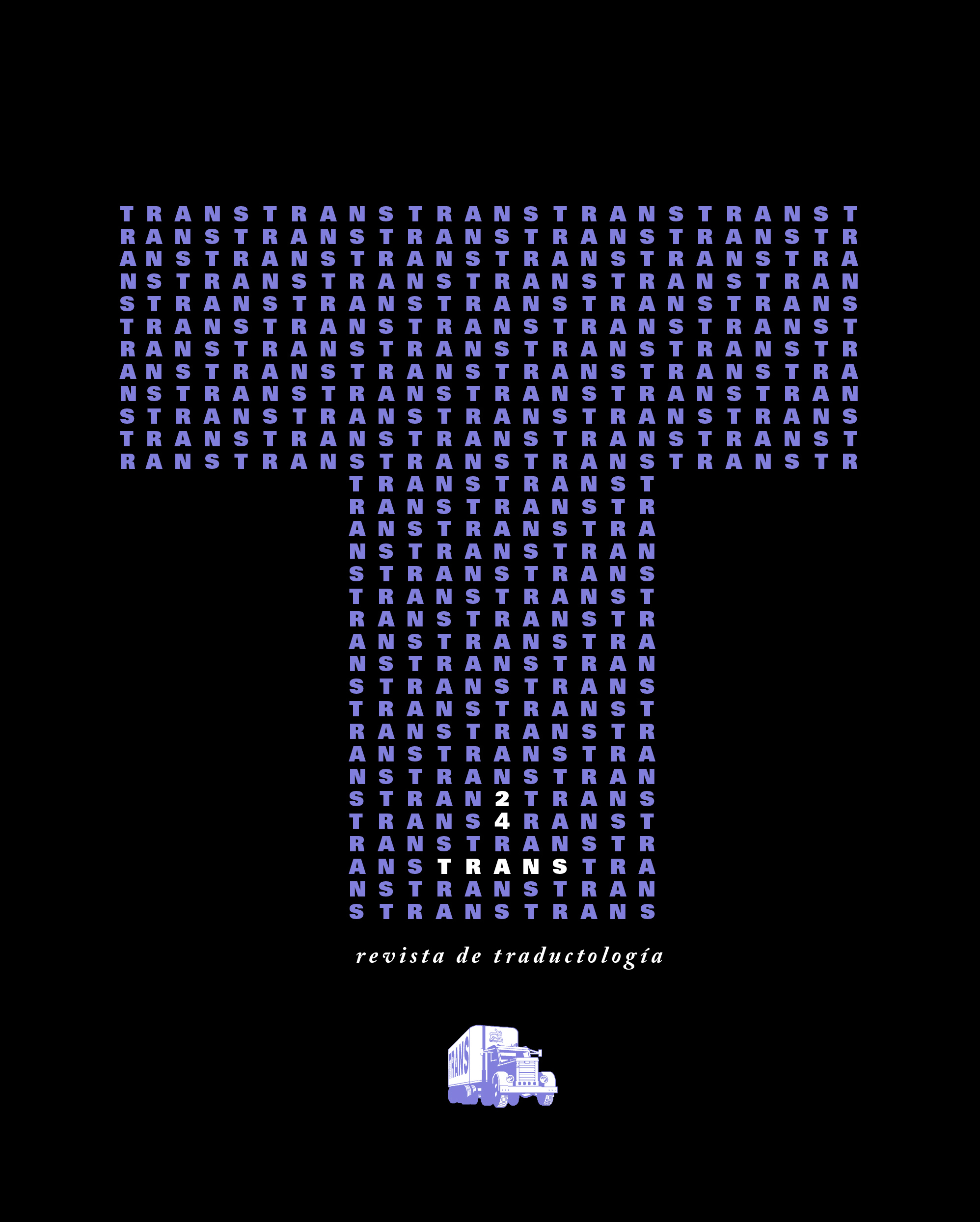Collaborative translation in Mapuche poetry: a contribution to the revitalization of Mapuzungun
DOI:
https://doi.org/10.24310/TRANS.2020.v0i24.6407Keywords:
collaborative translation, Mapuche poetry, translaboration, linguistic revitalizationAbstract
In contemporary Mapuche poetry, the practice of collaborative translation holds a special place in that it can be understood as one of the current efforts of intellectuals, writers and translators of the Mapuche nation to revitalize their vernacular language, Mapuzungun, within the cultural and literary fields. We will examine the case of the anthology of Mapuche poetry written by women, Kümedungun / Kümewirin (2010), where most Mapuzungun versions were translated by the poet and linguist Jaqueline Caniguan and her team of collaborators. The recreation of the language through neologisms, the ideological positioning of the translators and the reflections on the process developed in the paratexts of the anthology will be analyzed around a specific example: the collaborative translation of the poem «Mi destino» by Adriana Paredes Pinda.
Downloads
Metrics
Publication Facts
Reviewer profiles N/A
Author statements
Indexed in
-
—
- Academic society
- N/A
- Publisher
- Universidad de Málaga
References
Alfer, Alexa (2017): «Entering the Translab: Translation as Collaboration, Collaboration as Translation, and the Third Space of ‘Translaboration’», Translation and Translanguaging in Multilingual Contexts 3/3, 275-290.
Augusta, Fray Félix José de (1903): Gramática Araucana, Valdivia: Imprenta Central, 1903.
____(1991): Diccionario Araucano. Mapuche-Español. Español-Mapuche, Temuco: Editorial Kushe.
Bistué, Belen. (2013): Collaborative Translation and Multi-Version Texts in Early Modern Europe, Londres y Nueva York: Routledge.
Caniguan, Jaqueline (2010): «Para leer los poemas en mapuzungun y la historia de su traducción», Mora Curriao, Maribel y Fernanda Moraga (Eds.), Kümedungun/ Kümewirin. Antología poética de mujeres mapuche (siglos XIX y XX), trad. mapuzungun: Jaqueline Caniguan, Santiago de Chile: LOM, 21-25.
____(2007): «Un gran aporte en mi trabajo con el mapudungun», Garabide,
Cordingley , Anthony y Céline Frigau Manning (2017): Collaborative Translation: From the Renaissance to the Digital Age, London: Bloomsbury.
Cranfield, Steven y Claudio Tedesco (2017): «Reformulating the Problem of Translatability: A Case of Literary Translaboration with the Poetry of Francisco Brines». Translation and Translanguaging in Multicultural Contexts 3 (3), 304-322
Gaddis, Rose Marilyn (1997): Translation and Literary Criticism, Manchester: St. Jerome.
Genette, Gerard (2001 [1987]): Umbrales, México y Buenos Aires: Siglo Veintiuno.
Jansen, Hanne y Anne Wegener (2013): Authorial and Editorial Voices in Translation 1: Collaborative Relationships between Authors, Translators and Performers, Montréal: Éditions québécoises de l’oeuvre.
Loncón, Elisa y Francesco Chiodi (1999): Crear nuevas palabras. Innovación y expansión de los recursos lexicales de la lengua mapuche. Temuco: UFRO/CONADI.
Paredes Pinda, Adriana (2010): «Mi destino» en Maribel Mora Curriao y Fernanda Moraga (ed.), Kümedungun/Kümewirin. Antología poética de mujeres mapuche (siglos XIX y XX), trad. mapuzungun: Jaqueline Caniguan, Santiago de Chile: LOM, 422-427.
____(2013): Epu rume zugu rakiduam: Desgarro y florecimiento. La poesía mapuche entre lenguas. Tesis de Doctorado, Valdivia: Universidad Austral de Chile.
____(2014): Parias zugun, Santiago de Chile: LOM.
Toledano Buendía, Carmen (2013): «Listening to the voice of the translator: A description of translator’s notes as paratextual elements», Translation & Interpreting 5 (2), 149-162.
Tymoczko, María (2005): «Trajectories of Research in Translation Studies», Meta: Translator’s Journal 50/4, 1082-1097.
Downloads
Published
How to Cite
Issue
Section
License
All contents published in TRANS. Revista de Traductología are protected under the Creative Commons Attribution-NonCommercial-ShareAlike 4.0 International (CC BY-NC-SA 4.0) license. All about this license is available in the following link: <http://creativecommons.org/licenses/by-nc-sa/4.0>
Users can copy, use, redistribute, share and exhibit publicly as long as:
- The original source and authorship of the material are cited (Journal, Publisher and URL of the work).
- It is not used for comercial purposes.
- The existence of the license and its especifications are mentioned.
- ShareAlike — If you remix, transform, or build upon the material, you must distribute your contributions under the same license as the original.
There are two sets of authors’ rights: moral and property rights. Moral rights are perpetual prerogatives, unrenounceable, not-transferable, unalienable, imprescriptible and inembargable. According to authors’ rights legislation, TRANS. Revista de Traductología recognizes and respects authors moral rights, as well as the ownership of property rights, which will be transferred to University of Malaga in open access.
The property rights are referred to the benefits that are gained by the use or the dissemination of works. TRANS. Revista de Traductología is published in an open access form and it is exclusively licenced by any means for doing or authorising distribution, dissemination, reproduction, , adaptation, translation or arrangement of works.
Authors are responsable for obtaining the necessary permission to use copyrighted images.













21.png)
